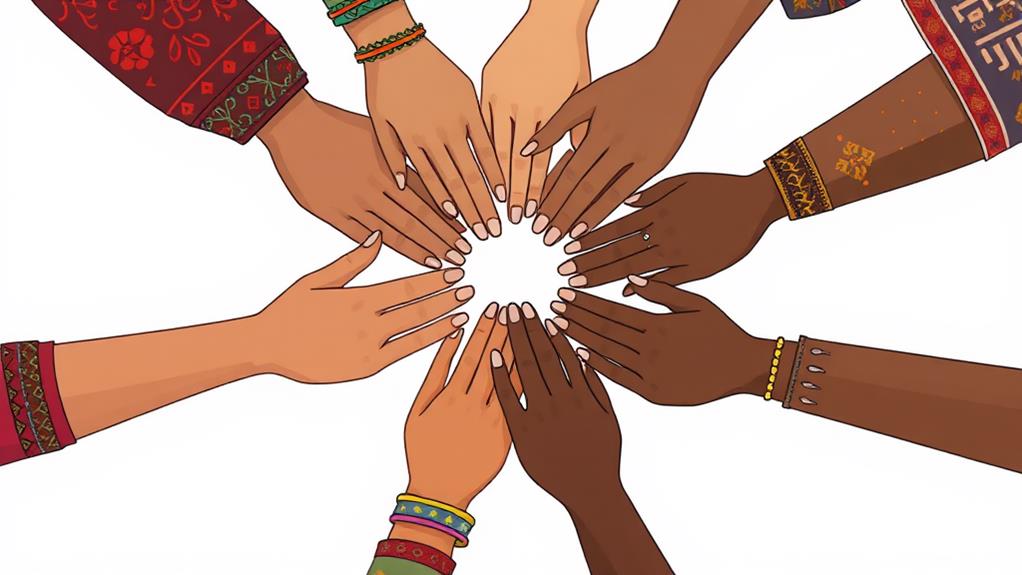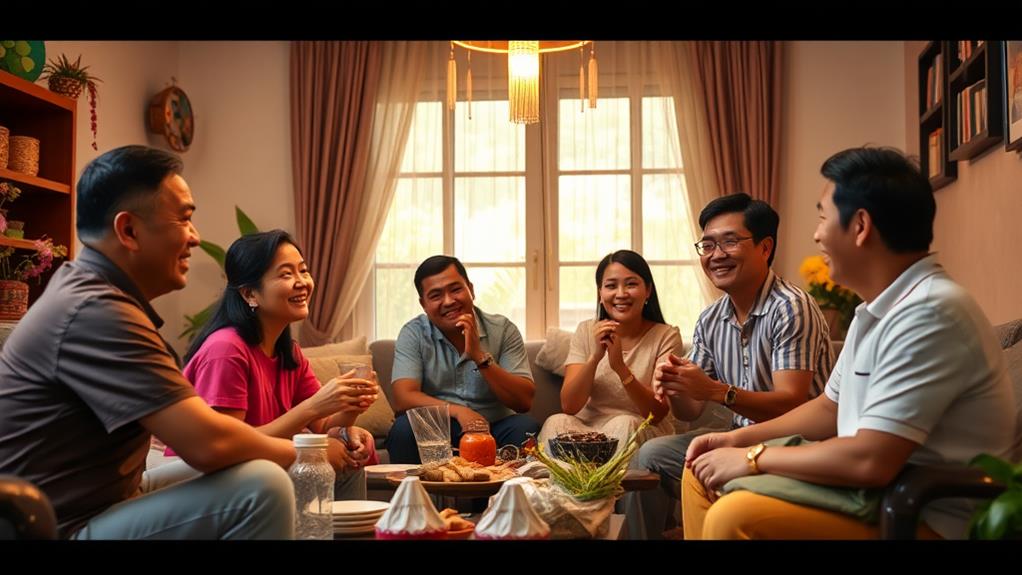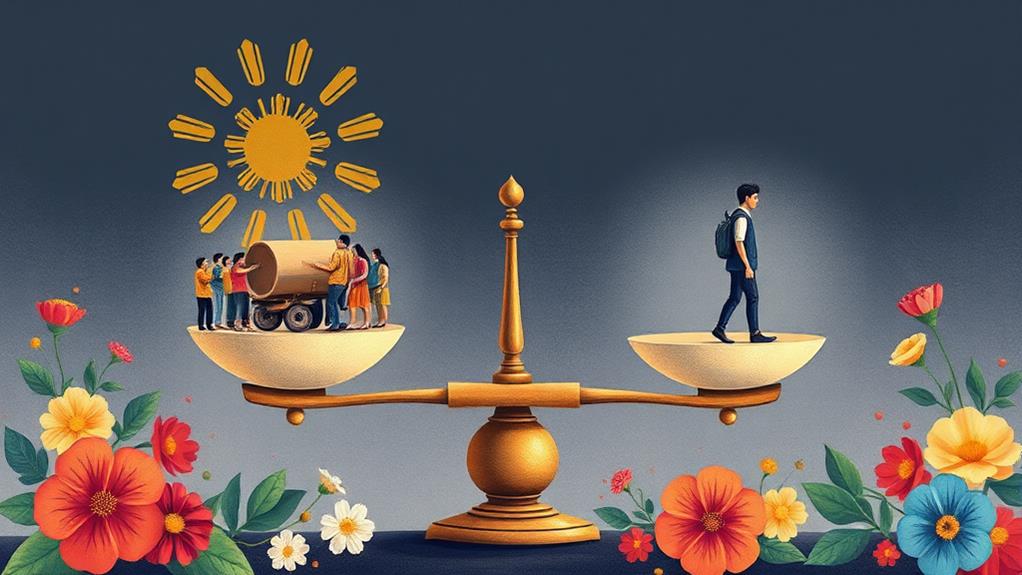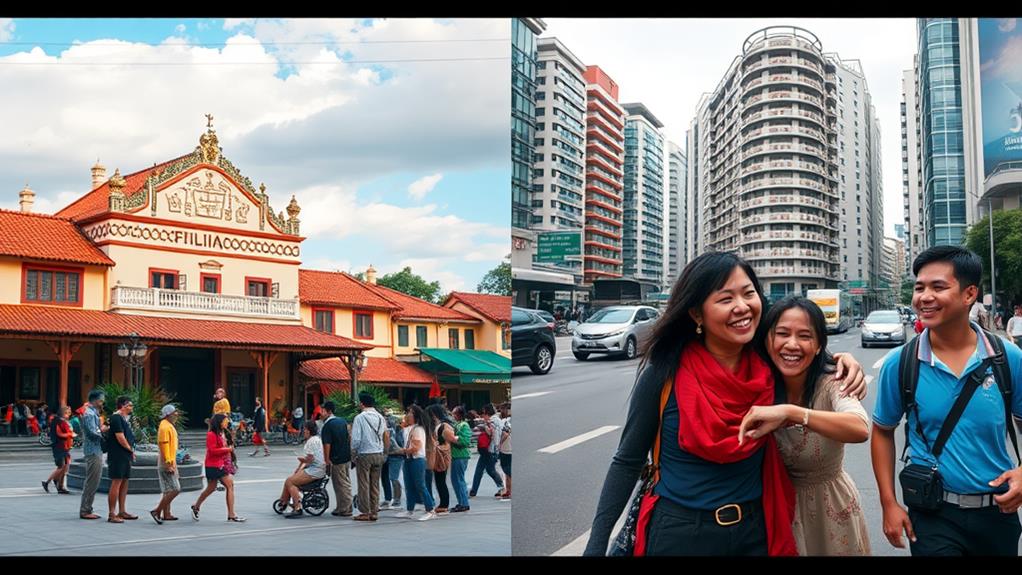Pakikisama: The Filipino Value of Getting Along
When interacting with Filipinos, you'll encounter pakikisama, a value that prioritizes social harmony and acceptance. This complex value balances harmony and confrontation to nurture relationships, closely tied to kapwa (shared identity) and hiya (social shame).
Pakikisama promotes group unity over individual achievements, fostering community and cooperation in collectivist Filipino culture. For example, in a Filipino family, individual success is often celebrated only if it brings honor to the family as a whole.
Pakikisama adapts to modern changes, such as urbanization, migration, and technology, shaping Filipino identity and community. In urban areas, pakikisama is seen in the strong sense of community in neighborhoods, where residents work together to maintain cleanliness and safety.
Pakikisama continues to influence interpersonal relationships, modern society, and beyond. In the workplace, pakikisama encourages collaboration and teamwork, leading to more effective problem-solving and decision-making.
By understanding pakikisama, you'll gain insight into the nuances of Filipino culture and community.
Definition and Cultural Significance

Pakikisama: The Filipino Value of Social Harmony
Pakikisama is a Filipino value that translates to "get along with" in English. It represents a deep-seated desire for social harmony, friendliness, and acceptance in interpersonal relationships. This value is deeply rooted in Filipino psychology and extends beyond mere getting along.
It's about yielding to majority decisions to promote a sense of belonging and social acceptance among peers.
Pakikisama is closely tied to other essential values like kapwa (shared identity) and hiya (social shame). These values are critical in building strong community ties, particularly in youth groups and workplaces.
By embracing pakikisama, Filipinos strike a delicate balance between harmony and confrontation, ensuring that relationships are nurtured and conflicts are resolved amicably.
However, pakikisama can be misinterpreted as Filipino submissiveness, which overlooks the complexity and nuance of this value in Filipino culture.
Pakikisama isn't about blind obedience, but rather about finding a balance between individual opinions and group harmony.
Historical Development of Pakikisama
Pakikisama's Evolution Over Time
Pakikisama, a crucial aspect of Filipino social dynamics, has undergone significant development since its identification in the 1960s. Frank Lynch was the first to recognize pakikisama as a vital component of Filipino social acceptance, highlighting its role in fostering group harmony and yielding to majority decisions.
Researchers' Contributions
Several researchers have contributed to our understanding of pakikisama. In the 1960s, Virgilio Enriquez challenged Western interpretations, categorizing pakikisama as a surface value.
Meanwhile, Lorenzana, Saito, and others explored its implications in social interactions, contributing to a deeper understanding of Filipino cultural values.
Link to Kapwa and Cultural Significance
Pakikisama is closely linked with the Filipino concept of kapwa, which emphasizes shared identity and collective social dynamics.
Over the decades, the importance of pakikisama has been reinforced as a critical element in youth groups, workplaces, and national identity, underscoring its cultural significance in maintaining harmonious relationships in Filipino society.
Importance in Filipino Interpersonal Relationships

In Filipino interpersonal relationships, pakikisama is essential for fostering a sense of community and harmony. This value emphasizes social harmony, respect, and empathy, shaping how Filipinos interact with each other.
Pakikisama promotes group unity over individual achievements, reflecting the collectivist culture of Filipinos. This sense of belonging is crucial in building strong relationships and navigating social dynamics smoothly.
Pakikisama enhances cooperation and productivity in workplaces by promoting harmony and avoiding conflict. This leads to better collaboration and results, as seen in successful Filipino businesses.
Valuing pakikisama strengthens communication and trust, even in challenging situations like healthcare settings. Effective communication is key to resolving conflicts and building strong relationships.
Pakikisama helps avoid social shame by preventing individuals from being labeled as mayabang (boastful). This is essential for being accepted within social circles and maintaining strong relationships.
Contextualizing Pakikisama in Modern Society
Pakikisama in Modern Urban Landscapes
In modern urban landscapes, pakikisama has evolved to focus on shared interests and experiences, fostering community connections. For instance, co-living spaces like Habitat in Ilo Ilo City and Lyf Cebu City provide communal areas and organized activities to enhance social bonds, exemplifying pakikisama in action.
Pakikisama in Urban Environments
Urban environments have given rise to new social networks and urban tribes, where individuals seek connection outside traditional community structures.
Pakikisama facilitates collaboration and support in these settings, shifting the focus from geographic proximity to community connections based on common values and goals.
Building Partnerships and Embracing Pakikisama
When building partnerships with Filipinas, embracing pakikisama helps foster group harmony and collective success. This is because pakikisama promotes a sense of community and mutual support, leading to stronger and more effective partnerships.
Technology and Pakikisama
Technology and social media have created new platforms for practicing pakikisama, allowing individuals to maintain connections and support networks across distances.
This has made it easier to cultivate meaningful relationships and contribute to the well-being of one's community, even in modern urban settings.
Balancing Individuality and Collectivism

Pakikisama: Balancing Individuality and Collectivism
Filipinos constantly navigate the delicate balance between individuality and collectivism, often finding themselves torn between pursuing personal aspirations and conforming to group expectations. Pakikisama, a Filipino trait, emphasizes group harmony and social cohesion, prioritizing collective well-being over individual desires.
However, it's possible to maintain personal identity while fostering mutual respect and understanding within group settings.
Cooperative Behavior in the Workplace
In workplace environments, pakikisama promotes cooperative behavior, where individual contributions are recognized within the framework of group achievements.
For instance, a team leader acknowledges an employee's innovative idea that contributed to the project's success, highlighting the individual's role in the collective achievement.
Communal Activities and Personal Growth
Pakikisama encourages engaging in communal activities that seek consensus while pursuing personal goals and growth.
For example, a group of friends plan a volunteer event, where each member contributes their skills and expertise to achieve a common goal, while also developing their individual skills and experiences.
Fostering a Sense of Community
Pakikisama fosters a sense of community that values collective success without suppressing individual aspirations.
In a community project, individuals work together to achieve a common goal, such as building a community center, while also pursuing their personal interests and passions.
Ethical Decision-Making and Assertive Communication
Pakikisama develops skills in ethical decision-making and assertive communication to ensure both personal integrity and social harmony.
For instance, an individual learns to express their opinions and concerns effectively, while also considering the impact on the group, leading to more informed and respectful decision-making.
Pakikisama in Urbanization and Migration
Pakikisama: A Vital Element in Urbanization and Migration
As urbanization and migration continue to shape the lives of Filipinos, pakikisama plays a crucial role in fostering community and social cohesion.
Filipinos who migrate to urban areas in search of better opportunities often strive to balance individual success with contributions to their home communities through practices rooted in pakikisama. This value enables them to maintain harmonious relationships with others, even in the midst of rapid urbanization.
The growth of co-living spaces, such as Habitat in Ilo Ilo City and Lyf Cebu City, reflects the evolving concept of pakikisama, emphasizing collaboration and social bonding among residents.
Research indicates that communal living arrangements in urban environments encourage Filipinos to share resources and experiences, thus reinforcing the value of pakikisama in modern contexts.
In urban settings, new urban tribes are forming, with Filipinos seeking support networks that aren't limited by physical proximity.
This showcases how pakikisama adapts to changing social dynamics.
Evolution of Pakikisama in Urban Spaces

Pakikisama Evolves in Urban Spaces
In response to the challenges of urban living, new urban tribes are redefining the concept of pakikisama in metropolitan settings. As city dwellers navigate complex urban life, pakikisama adapts to accommodate their needs.
Resource Sharing Fosters Social Bonding
Filipinos in urban areas come together to share resources, such as wifi sharing, which creates opportunities for social bonding and fosters pakikisama. This shared experience strengthens social connections and promotes a sense of community.
Communal Activities Enhance Interpersonal Relationships
Urban living encourages communal activities like karaoke nights, which play a significant role in interpersonal relationships and maintaining social bonds. These shared experiences bring people together, reinforcing the value of pakikisama.
Co-Living Spaces Promote Social Interaction
The rise of co-living spaces in urban areas exemplifies how urban design promotes social interaction and collaboration, enhancing the value of pakikisama among residents.
These spaces encourage socialization, mutual support, and a sense of community.
New Urban Communities Form Around Shared Interests
New urban communities often form around shared interests rather than geographical ties, demonstrating the dynamic nature of pakikisama in contemporary Filipino society.
These communities bring together people with common interests, fostering a sense of belonging and social connection.
Pakikisama Remains Key in Urban Areas
The ongoing importance of pakikisama in creating supportive networks and maintaining cultural values amidst changing lifestyles is evident in the demand for communal spaces in urban areas.
These spaces provide opportunities for social interaction, mutual support, and a sense of community, highlighting the continued relevance of pakikisama in urban Filipino society.
Co-Living Spaces and Community Building
Co-living spaces are redefining community building and pakikisama in urban Philippines. These communal living arrangements promote collaboration and innovation, often featuring shared amenities and organized activities led by community leaders.
Spaces like Habitat in Iloilo City and Lyf Cebu City are designed to enhance social interaction and foster community among residents. They target millennials and travelers, providing a platform for like-minded individuals to connect and share experiences.
These co-living spaces facilitate networking opportunities, allowing residents to share resources and expertise. By living alongside others with similar interests, residents can tap into a collective knowledge base and build meaningful relationships.
The shift towards community-building reflects the evolving nature of pakikisama. Shared interests and community engagement now take precedence over physical proximity. This new era of pakikisama is characterized by a sense of shared purpose and belonging, redefining the Filipino psyche.
Co-living spaces provide more than just affordable housing options. They offer a platform for residents to connect, collaborate, and innovate, ultimately contributing to a stronger sense of community and social connection.
Pakikisama in Healthcare and Wellness

Pakikisama plays a significant role in healthcare and wellness, particularly in the Filipino community. Relatable interactions and trust in clinicians are crucial factors in accessing quality care. In many cases, family members take on the role of navigators in healthcare, highlighting the importance of pakikisama in overcoming barriers to effective care delivery.
Culturally meaningful interactions are essential in healthcare. Providers who understand pakikisama can deliver more effective care by considering cultural and linguistic nuances that impact health outcomes in the Filipino community. For instance, acknowledging the importance of respect for authority figures in Filipino culture can lead to better patient-provider relationships and improved health outcomes.
Family-centered care is a prevalent theme in Filipino healthcare experiences. Shared responsibilities and support networks reflect the value of pakikisama, where family members often take on caregiving roles. This approach can lead to better health outcomes and more effective care delivery.
Pakikisama helps address barriers that hinder access to quality care. By acknowledging the role of pakikisama, healthcare providers can identify and address these barriers, leading to improved health outcomes and better navigation of health services. For example, providers can address language barriers by using interpreters or providing multilingual resources.
Community-based care is fostered by pakikisama, promoting a sense of community and shared responsibility. This approach can lead to more effective care delivery and better health outcomes in both urban and rural settings.
For instance, community-based initiatives can provide access to health services and education, improving overall health outcomes.
How Does the Value of Bahala Na Play into the Concept of Pakikisama in Filipino Culture?
In Filipino culture, the value of “Bahala Na” plays into the concept of Pakikisama, reflecting the Filipino attitude of resilience. This mindset allows individuals to face uncertainty with a sense of courage and adaptability, fostering a strong community bond and mutual support in times of hardship.
Preserving Cultural Heritage and Integrity
Pakikisama and Cultural Heritage
Pakikisama plays a vital role in preserving Filipino cultural heritage by emphasizing community and interpersonal relationships. This cultural value ensures that traditions and values are passed down to future generations.
Social Gatherings and Cultural Norms
In social gatherings like fiestas and family reunions, pakikisama is practiced through shared food, stories, and laughter.
These events serve as vital platforms for reinforcing cultural norms and enhancing interpersonal relationships. They provide opportunities to pass down cultural heritage and traditions to future generations.
Culturally Meaningful Practices
Pakikisama is demonstrated through various culturally meaningful practices. These include:
- Bayanihan spirit in communal projects, which promotes cooperative efforts, social bonds, and collective identity.
- Respect for elders and traditions, which upholds ancestral practices and honors heritage.
- Empathy and cooperation in daily life, which navigates social dynamics while maintaining cultural identity.
- Community service and volunteer work, which reinforces social bonds and collective identity.
- Preserving traditional arts and crafts, which passes down cultural heritage to future generations.
Frequently Asked Questions
What Are the Values of Pakikisama in Filipino?
Pakikisama promotes social harmony and community bonding in Filipino culture. This value emphasizes cooperation, consideration, and yielding to maintain harmony, reflecting the collective identity prevalent in Filipino society.
For instance, in a Filipino family, pakikisama is practiced when a younger sibling yields to an older sibling's decision to maintain peace and avoid conflict.
Pakikisama prioritizes group progress over personal achievements. By doing so, it promotes a sense of belonging, underscoring the cultural significance of social acceptance and shared identity.
For example, in a Filipino workplace, pakikisama encourages employees to work together towards a common goal, rather than competing against each other for individual recognition.
Pakikisama balances cooperation with confrontative values when necessary. This means that while Filipinos value harmony, they also know when to stand up for themselves or their community when confronted with opposing views or interests.
In a community meeting, for instance, pakikisama allows individuals to express their opinions and concerns while still respecting the opinions of others.
What Are the Filipino Concepts of Pakikisama Getting Along and Its Impact on Social Relationships?
Pakikisama: The Filipino Value of Getting Along
In Filipino culture, pakikisama is a vital concept that prioritizes getting along and harmony in social relationships. This value promotes cooperation and strengthens bonds within community groups and workplaces. By embracing pakikisama, individuals prioritize harmony and avoid conflict to maintain social acceptance.
Pakikisama in Action
In community groups, pakikisama is demonstrated when individuals yield to majority decisions to preserve unity. For instance, in a neighborhood organization, members may agree to a decision even if they don't fully support it to avoid conflict and maintain harmony.
This doesn't mean individuals are submissive; rather, they balance harmony with constructive confrontation when addressing injustices.
The Impact of Pakikisama
Pakikisama reinforces community cohesion by encouraging individuals to prioritize harmony over personal interests. This value also promotes a sense of belonging and social acceptance, which is essential in Filipino culture.
What Is an Example of a Pakikisama Scenario?
Pakikisama is the value of prioritizing harmony and cooperation over personal interests.
In a community that values pakikisama, individuals willingly make sacrifices for the benefit of others. For example, at a family reunion, you might share food and resources with others to strengthen social bonds.
Similarly, at community gatherings like fiestas, you might lend a hand to neighbors to ensure a successful celebration.
In a workplace setting, pakikisama can manifest as adapting to the team's dynamics to maintain workplace harmony.
What Are the Positive Effects of Pakikisama?
Pakikisama promotes community harmony by creating a supportive environment where individuals feel valued. This is achieved when individuals prioritize getting along, leading to a sense of belonging and increased productivity.
Conflict resolution becomes smoother as individuals become more considerate of others' feelings. For instance, when resolving conflicts, individuals will be more empathetic and understanding, resulting in more effective solutions.
Cultural connectivity strengthens when mutual respect and empathy are promoted. This leads to a positive organizational culture, where individuals from diverse backgrounds work together harmoniously.
A harmonious community thrives when individuals prioritize getting along. This is characterized by a sense of belonging, increased productivity, and a positive organizational culture.